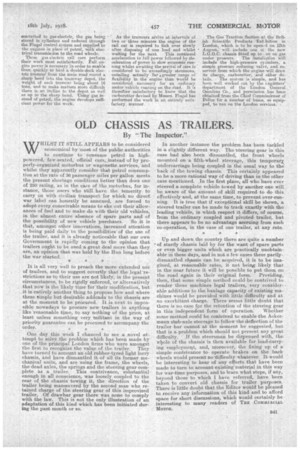OLD CHASSIS AS TRAILERS.
Page 17

If you've noticed an error in this article please click here to report it so we can fix it.
By "The Inspector."
WEIILST IT STILL APPEARS to be considered economical by most of the public authorities to continue to consume petrol in highpowered, few-seated, official cars, instead of by properly-organized motorbus or wagenette services, and whilst they apparently consider that petrol consumption at the rate of 26 passenger miles per gallon• meets the present shortage conditions better than does one of 250 rating, as in the caae of the motorbus, for instance, those users who still have the teinerity to carry on with civilian transport for which no direct war label can honestly be annexed, are forced to adopt every, conceivable means to eke out their" allowances of fuel and to make do with their old vehicles, in the almost entireabsence of spare parts and of the possibility of new vehicle purchases. So it is that, amongst other innovations, increased attention is being paid daily to the possibilities of the use of the trailer, and it is already noticeable that our own Government is rapidly coming to the opinion that trailers ought to be used a great deal more than they are, an opinion that was held by the Hun long before
the war started. .
It is all very Ivell to preach the more extended use of trailers, and to suggest covertly that the legal-restrictions as to their use are not likely, in the present circumstances, to be rigidly enforced, or alternatively that now is the likely time for their modification, but it is entirely another thing to propose how and where these simple but desirable addenda to the chassis are at the moment to be procured. It is next to impossible nowada-ys to procure new trailers in anything like reasonable time, to say nothing of the price, at least unless something very militant in the way of priority guarantee can be procured to accompany the
order. * 0
One day this week I chanced to see a novel attempt to solve the problem which has been made by one of the principal London firms who were amongst the first to recognize the value of the trailer. They. have turned to account an old rubber-tyred light lorry chasais, and have dismantled it-of all its former mechanical units, and are using the frame, the wheels, the dead axles, the springs and the steering gear complete as a trailer. This contrivance, substantial enough in all conscience, was loosely coupled to the rear of the chassis towing it, the direction of the trailer being manoeuvred by the second man who retained charge of the steering gear of this improvised trailer. Of drawbar gear there was none to comply • with the law. This is not the only illustration of an adaptation of this kind which his been initiated during the past month or so. In another instance the problem has been tackled in a slightly different way. Thee-steering gear in this case had also been dismantled, the front wheels mounted on a fifth-wheel steerage, this temporary undercarriage being coupled in the usual way to the back of the towing chassis. This certainly appeared to be a more rational way of driving than in the other case mentioned. In the first place, all who have ever steered a complete vehicle towed by another one will be aware of the amount of skill required to do this effectively and, at the same time, to prevent over-running. It is true that if exceptional skill be shown, a steered trailer can be made to track exactly with the leading vehicle, in which respect it differs, -of course, from the ordinary coupled and pivoted trailer, but there appears to be no advantage accruing from such co-operation, in the case of one trailer, at any rate.
Up and down the country there are quite a number of sturdy chassis laid by for the want of spare parts or even bigger units which are praetically unobtainable-in these days, a,nd in not a few eases these partlydismantled chassis can be acquired, it is to be imagined, at reasondble rates, it not being likely that in the bear future it will be possible to put them on the road again in their original form. Providing, then, that some simple method could be contrived to render these machines legal trailers, very considerable additions to the haulage capacity of existing machines would be provided with little difficulty and at no exorbitant charge. There seems little doubt that there is no case for the retention of the steering gear in this independent form of operation. Whether some method could be contrived to enable the Ackermann stub-axle steerage to follow the deflection of the trailer bar cannot at the Moment be suggested, but that is a, problem which should not present any great difficulty. if the steersman be dispensed with, the whole of the ehaSsis is then available for load-carrying employment, and, moreover, the fixing up of a simple contrivance to operate brakes on the back . wheels would present rm.-difficulty whatever. It-would be interesting to hear of any efforts that have been made to turn to account existing material in this way for war-time purposes, and to learn what steps, it any, beyond those to which I have referred, have been taken to convert old chassis for trailer purposes. There is little doubt that the Editor would be pleased to receive any information of this kind and to afford space for short discussions, Which would certainly be interesting to many readers of TEE CONIMIRCIAL MOTOR.






















